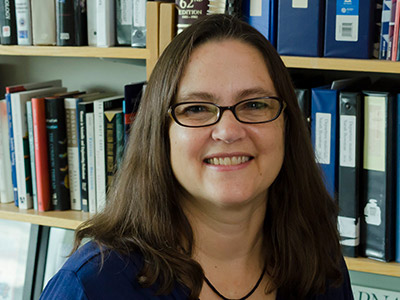
During a time of academic uncertainty, Li aims to help guide the department in continuing to be a worldwide leader in education, biological sciences, and fundamental research.
Lillian Eden | Department of Biology
October 6, 2025
Associate Professor of Biology Gene-Wei Li has accepted the position of Associate Department Head starting in the 2025-2026 academic year.
Li, who has been a member of the department since 2015, brings a history of departmental leadership, service, and research and teaching excellence to his new role. He has received many awards, including a Sloan Research Fellowship (2016), an NSF Career Award (2019), Pew and Searle scholarships, and MIT’s Committed to Caring Award (2020), In 2024, he was appointed as an HHMI Investigator,
“I am grateful to Gene-Wei for joining the leadership team,” says Department Head and Jay A. Stein (1968) Professor of Biology and Professor of Biological Engineering Amy E. Keating. “Gene will be a key leader in our educational initiatives, both digital and residential, and will be a critical part of keeping our department strong and forward-looking.”
A great environment to do science
Li says he was inspired to take on the role in part because of the way MIT Biology facilitates career development during every stage—from undergraduate and graduate students to postdocs and junior faculty members, as he was when he started in the department as an assistant professor just ten years ago.
“I think we all benefit a lot from our environment, and I think this is a great environment to do science and educate people, and to create a new generation of scientists,” he says. “I want us to keep doing well, and I’m glad to have the opportunity to contribute to this effort.”
As part of his portfolio as Associate Department Head, Li will continue in the role of Scientific Director of the Koch Biology Building, Building 68. In the last year, the previous Scientific Director, Stephen Bell, Uncas and Helen Whitaker Professor of Biology and HHMI Investigator, has continued to provide support and ensured a steady ramp-up, transitioning Li into his new duties. The building, which opened its doors in 1994, is in need of a slate of updates and repairs.
Although Li will be managing more administrative duties, he has provided a stable foundation for his lab to continue its interdisciplinary work on the quantitative biology of gene expression, parsing the mechanisms by which cells control the levels of their proteins and how this enables cells to perform their functions. His recent work includes developing a method that leverages the AI tool AlphaFold to predict whether protein fragments can recapitulate the native interactions of their full-length counterparts.
“I’m still very heavily involved, and we have a lab environment where everyone helps each other. It’s a team, and so that helps elevate everyone,” he says. “It’s the same with the whole building: nobody is working by themselves, so the science and administrative parts come together really nicely.”
Teaching for the future
Li is considering how the department can continue to be a global leader in biological sciences while navigating the uncertainty surrounding academia and funding, as well as the likelihood of reduced staff support and tightening budgets.
“The question is, how do you maintain excellence?” Li says. “That involves recruiting great people and giving them the resources that they need, and that’s going to be a priority within the limitations that we have to work with.”
Li will also be serving as faculty advisor for the MIT Biology Teaching and Learning Group, headed by Mary Ellen Wiltrout, and will serve on the Department of Biology Digital Learning Committee and the new Open Learning Biology Advisory Committee. Li will serve in the latter role in order to represent the department and work with new faculty member and HHMI Investigator Ron Vale on institute-level online learning initiatives. Li will also chair the Biology Academic Planning Committee, which will help develop a longer-term outlook on faculty teaching assignments and course offerings.
Li is looking forward to hearing from faculty and students about the way the institute teaches, and how it could be improved, both for the students on campus and for the online learners from across the world.
“There are a lot of things that are changing—what are the core fundamentals that the students need to know, what should we teach them, and how should we teach them?”
Although the commitment to teaching remains unchanged, there may be big transitions on the horizon. With two young children in school, Li is all too aware that the way that students learn today is very different from what he grew up with, and also very different from how students were learning just five or ten years ago—writing essays on a computer, researching online, using AI tools, and absorbing information from media like short-form YouTube videos.
“There’s a lot of appeal to a shorter format, but it’s very different from the lecture-based teaching style that has worked for a long time,” Li says. “I think a challenge we should and will face is figuring out the best way to communicate the core fundamentals, and adapting our teaching styles to the next generation of students.”
Ultimately, Li is excited about balancing his research goals along with joining the department’s leadership team and knows he can look to his fellow researchers in Building 68 and beyond for support.
“I’m privileged to be working with a great group of colleagues who are all invested in these efforts,” Li says. “Different people may have different ways of doing things, but we all share the same mission.”













